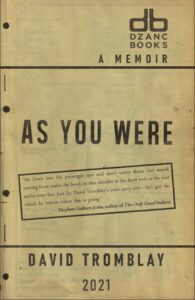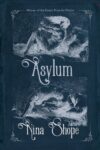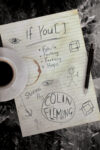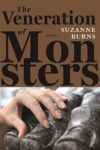
[Dzanc Books; 2021]
Content warning: Child and animal abuse. As You Were is a book that writes about abuse, and while this review does not explicitly specify the details of events that occur, it does feature descriptions and discussions of child and animal abuse.
The scenes set in an Iraqi detainee prison are probably the least disturbing parts to read in David Tromblay’s new memoir, As You Were. Chapter after chapter, scene after scene, readers follow David through chronic physical and psychological abuse at the hands of his father and grandmother and, later, through his own lingering internal struggles. The dry sense of humor infusing the spaces between incidents of abuse does little to soften the impact when those moments arrive. Tromblay’s skill with prose intensifies the experience so that when you arrive at the end of the book and read in the acknowledgments from the author’s sister the line, “you barely scratched the surface of what they did to you,” everything that has come before takes on a deeper, darker shade. It’s so hard to think of a person going through far more, and perhaps worse, than what the reader encounters in the memoir. This is not a casual read for a beach day. As You Were is a book you read to understand the intergenerational cycles of abuse. Though it may be too traumatic for some survivors, for others, reading about Tromblay’s suffering will make them feel less alone. For many readers, Tromblay’s gift may be perspective, a reminder of what a life can really entail, how powerless each of us is to stop what happens to us, and how much strength it takes to keep going.
As You Were could be titled How It Feels To Be At The Mercy Of for its commitment to writing through the oppressive helplessness of a child at the mercy of his caretakers, of a Native American at the mercy of a boarding school, of a soldier at the mercy of the army and the war, of a detainee at the mercy of a foreign occupying force. There are moments of rebellion, like when, at fourteen, David steals money from his father for karate lessons and ends up using what he learns there to liberate himself from his father’s tyranny. But that liberation is short-lived and within a few years, David is at the mercy of superior military officers. Though David exerts himself against being at the mercy of trauma, the reader also learns that he ground all the teeth out of his jaw while he slept and that these teeth weren’t his real teeth (his grandmother had knocked those out years before). The physical manifestations of his internal suffering, such as teeth-grinding, show that the physical abuse never stopped, only changed forms — his trauma settling inside, and tormenting, his body.
The whole memoir is narrated in the second person, constantly addressing the reader as “you.” The choice to interpolate the reader as the subject has the effect of distancing the narrator from himself. However, as the memories and experiences are so unique and vividly described, “you” could easily have been “I.” It’s easy to see why a writer would disassociate from the events of this memoir in order to describe them; the details of trauma must be excruciating to recall. However, the cognitive dissonance of being reminded of traumatic memories the reader themself has not experienced can also have the effect of disassociating the reader from the fullest capacity of empathy. Take, for example, the time Audrey teaches David not to touch the toaster. He describes, “she plops your forearm across the top of it and presses down until you can’t breathe enough to cry and then your shoes slide out from underneath you when the puddle of piss around your feet makes the linoleum too slippery to stand.” Horrific and detailed as that description is, the second person narration means that I, the reader, am being told my grandmother held my arm to a hot toaster to burn me. This makes the scenario feel fictitious because, if taken literally as described, this did not happen. I have no trouble accepting and imagining that David Tromblay’s grandmother burned him on the toaster, but “you” assigns the memory to me; but having not experienced this trauma, especially in its specificity, it feels harder to imagine myself in the narrator’s place than if the narrator used the first or third person narration. Perhaps this memoir would have been too harrowing if rendered in the first person and the cognitive dissonance provides a buffer, for both reader and writer, and I’m sure that some readers will respond differently than I to the second person narration.
Throughout the interconnected stories, the reader learns that abuse has causes but few solutions. For example, David’s father, Dick, abused his son due to his own limited self-control. The memoir portrays Dick as both an incredibly violent adult man who he fantasized about murdering and as a permanent juvenile, lacking the capacity to grow and mature. Dick was struck by a car and suffered a traumatic brain injury that left his judgment impaired. He was also a severe alcoholic, perhaps because of the TBI or perhaps due to other factors. Whatever the source of Dick’s alcoholism, it is clear that Dick’s drinking is a primary catalyst to abuse and violence, which is often, as David notes, juvenile and impulsive. Like when David writes of playing checkers with his father, calling it “Suicide Checkers” because “telling Dad you’ve won is just asking for a beating. It’s suicide.” Throughout David’s childhood, his father repeats to him, “The day you can take me is the day you can move out.” When that day comes and David wins a fight against his drunken father, David is only fourteen, which means he’d been threatened with the impending father vs son battle, and that battle came to fruition, before David even entered high school.
Each chapter in the book functions like an episode or short story. The chapter called “All Dogs God to Heaven” is a litany of ways Dick violently killed family dogs. In other stories, we read how Dick cracked David’s skull, nearly choked him to death, stomped on his son’s genitals until he urinated himself after smashing the boy’s head into a doorknob (for forgetting to buy sour cream), and slammed his son’s body through a wooden cabinet door. Aside from one crying aunt and an occasional small protest from Audrey that Dick may kill David, no one comes to David’s aid against his father or grandmother. Whether the fact no one saw the need to intervene was because they feared Dick completely, or whether it was a consequence of their own experiences with trauma having normalized violence, it is not clear, but the point is made that during these experiences a child is fully at the mercy of a parent and completely vulnerable.
Like Dick, David’s grandmother, Audrey, abuses David as a result of her own trauma. Grandma Audrey, who is David’s primary caretaker, grew up in a boarding school where Native American children were abused as a means of erasing their cultures. Audrey internalized the colonial brainwashing and largely removed Native American identity from her family’s lives. She was proud of the fine cursive she learned to write at the boarding school and married white men. We never hear stories of abuse from the boarding school in the memoir, but they creep into the story in a much more immediate and disturbing way. Audrey’s treatment of David clearly echoes what she must have endured at the boarding school, especially her intolerance and violence toward basic childhood behaviors, like play. The boarding school method of parenting comes into play when she teaches David to read by punishing every mistake with a ruler to the knuckles. She locks him in a closet for a day when he points out she was closer to something she wanted him to hand to her. Her demeanor is of a sadist who hates children, a demeanor learned from sadists who hate children; the type of people who would abuse Native American children for speaking their own language; a demeanor learned from caretakers who did not love those in their care. A childhood of abuse, and an adulthood of abusing, mean Audrey’s funeral is “odd, as far as funerals go – seeing as no one really crie[d].”
In his memoir, when David writes of Audrey, he often writes of loss. Along with the loss of her maternal instinct, Audrey lost her culture, meaning subsequent generations of her family also lost their cultures. This is powerfully described in a scene where David remembers his grandmother singing. He recalls, “Grandma’s voice is velvet.” He remembers listening to her “voice quake” as a Johnny Cash song told her “a story about a Pima India with whom she shares a last name.” The song tells the story of a “whiskey-drinking Indian” who joins the Marines and later dies from drinking, destitute. “He sings about the white men who stole their water rights and how the sparkling water stopped. Her grandson was born where the water stops – in Anishinaabemowin, that is: Nah-Gah-Chi-Wa-Nong. Not that she can speak a word of the language. Not that she lets on.” David remembers her sentimental reaction to the song while Audrey has locked him in a closet overnight for a minor infraction after whipping him with wire hangers.
The choice to pair this humanizing memory of Audrey with a setting of abuse helps the reader understand how to think about her as well. It serves as a reminder that she spent her childhood in a boarding school where she was likely whipped and subjected to isolating punishments; that the cost of her abuse was her culture, the loss of which makes her sob at a song. Although, the scene closes with a telling skepticism of how much of her culture lay dormant in her mind — “Not that she lets on”. The boarding school would have punished Audrey for speaking her native language and, on one hand, David accepts that the language is lost to her. Whether or not she remembers her language, she cannot speak it. By including, “Not that she lets on,” the narrator asks readers to get into Audrey’s head and wonder how someone could hide their ability to speak a language. That language would have to be associated with extreme pain or shame, and someone would need to be conditioned to avoid it so forcefully that others don’t believe they can speak it at all.
For all the violence, there were few instances in which violence might be said to have a justifiable motive, albeit through the distinctly different intentions of defense and protection: his Grandpa Bub, Audrey’s husband, hits a kid who stole David’s bike once; while in another scene, David intervenes to protect his neighbor, Jeremy, from bullies. Throughout, David occupies the only sympathetic role for long stretches of the book. His sister and mother, sidelined and abused themselves, appear throughout in glimpses. Audrey dies before David has a chance to confront her. Dick never improves; his involvement ends with a beat down in which David attacks his father’s umbilical hernia. Even David’s mother, who he loved and who tried to inject moments of love and kindness into his childhood, dies in his absence. The culmination of all the graphically described violence and neglect, it seems, was that relationships didn’t evolve.
In some ways, David’s time in the military feels like a continuation of his childhood. Dick and Audrey are replaced by military hierarchy and the familial abuse against David is replaced by institutionalized abuse of detainees in an American military prison in Iraq. If the American soldiers, like David, were somewhat parallel to Audrey (violent but, to some extent, restrained), then the Kurdish soldiers supporting the Americans in their efforts to contain Arab POWs were like Dick in their excessive cruelty and violence. The book diminishes the space between the privacy of familial abuse and the public violence of war. What people find abhorrent when inflicted upon a child in a family setting somehow becomes acceptable when carried out by a soldier in a wartime setting. Trombley reminds us that, within both settings, there are degrees, perhaps nuances, to violence and abuse; no matter how badly someone might treat a person, there is always someone else willing to employ even more extreme violence waiting.
As You Were powerfully demonstrates how helplessness derives from these concentric levels of threat. Why do people tolerate abuse? Because that abuser stands between them and a more fearsome abuser? With regard to trauma and surviving trauma, the body in a pursuit to protect itself sometimes reconceptualizes levels of threat as levels of safety. For the Arab detainees, to be at the mercy of Kurdish troops or the militaries of their home countries meant certain death. This threat allowed some detainees to conceptualize American prison as a form of safety. Grandma Audrey didn’t fully protect David from Dick, but, if the scenes of Dick’s violence we encounter in the memoir only scratch the surface, it seems likely that living with Grandma Audrey kept David from being killed by his father. When Audrey locks David in a closet overnight – a form of abuse – David interprets it as safety because he knows his punishment means he will be left alone and free from violence.
A conversation David has with a detainee nicknamed The Big Show (after the WWE wrestler whom he resembles) glimpses into how a detainee’s mind justified being at the mercy of American troops and how he thought about levels of safety. While being transported, the Big Show jokingly shows David his shackles and says that David has shackles, too. He quickly clarifies that David’s shackles are the US military’s shackles – the Geneva Convention that prohibits the worst treatment of prisoners of war. The detainee laughs and says, “We kill soldiers, you give us ice cream and air conditioning. Some of us never eat three times in one day before we come to Suse (the prison).” Following this statement, the chapter goes into how detainees are executed immediately upon return to their home countries and then goes into a list of traumatic war experiences David wouldn’t tell his wife over the phone, before finally ending with the story of Grandma Audrey hitting David into a metal rail and knocking his teeth out. Here, Trombley demonstrates how traumas are interconnected in memory. He reacts, physically and psychologically, to trauma as trauma, whether it is wartime or childhood. In fact, the memory of childhood trauma colors and intensifies the adult traumas he can’t or won’t tell his wife about. The cumulative effect of these traumas manifests in David’s body and mind when he gets home and he becomes suicidal. He is finally in an environment that can offer safety, able to reach a life not spent responding to constant threat or fear, but his PTSD perpetuates his years of fear and suffering.
It is remarkable that Tromblay is willing to offer traumas from his own experience so that others can scratch the surface of understanding abuse. Any writer must admire the strength it takes to hone trauma, draft after draft, into a memoir. The truths are deeply valuable. Readers learn about levels of abuse, how one abuser may stand between you and an even worse abuser, and how all your traumas are interconnected within you. Tromblay may not articulate his ideas in these words, but the reader will learn from a book like As You Were because every reader becomes interconnected to the stories through the degrees of trauma they themselves have experienced. For that reason, readers should assess their own trauma carefully before reading and center care in their reading, offering their own and Tromblay’s experiences the space they deserve.
Eric Aldrich’s recent work has appeared in Hobart, Manifest West, The Worcester Review, and The Arcanist. His novella, Please Listen Carefully as Our Options Have Changed, is forthcoming from Running Wild Press. You can follow Eric via ericaldrich.net or @ericjamesaldrich on Instagram.
This post may contain affiliate links.







